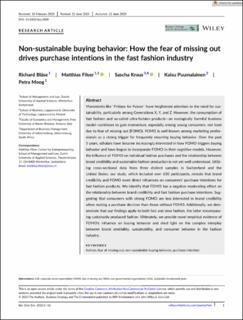Please use this identifier to cite or link to this item:
https://doi.org/10.21256/zhaw-29690Full metadata record
| DC Field | Value | Language |
|---|---|---|
| dc.contributor.author | Bläse, Richard | - |
| dc.contributor.author | Filser, Matthias | - |
| dc.contributor.author | Kraus, Sascha | - |
| dc.contributor.author | Puumalainen, Kaisu | - |
| dc.contributor.author | Moog, Petra | - |
| dc.date.accessioned | 2024-02-02T08:43:06Z | - |
| dc.date.available | 2024-02-02T08:43:06Z | - |
| dc.date.issued | 2023-07-17 | - |
| dc.identifier.issn | 0964-4733 | de_CH |
| dc.identifier.issn | 1099-0836 | de_CH |
| dc.identifier.uri | https://digitalcollection.zhaw.ch/handle/11475/29690 | - |
| dc.description.abstract | Movements like “Fridays for Future” have heightened attention to the need for sustainability, particularly among Generations X, Y, and Z. However, the consumption of fast fashion and so-called ultra-fashion products—an ecologically harmful business model—continues to gain momentum, especially among young consumers, not least due to fear of missing out (FOMO). FOMO is well-known among marketing professionals as a strong trigger for frequently recurring buying behavior. Over the past 5 years, scholars have become increasingly interested in how FOMO triggers buying behavior and have begun to incorporate FOMO in their cognitive models. However, the influence of FOMO on individual fashion purchases and the relationship between brand credibility and sustainable fashion production is not yet well understood. Utilizing cross-sectional data from three distinct samples in Switzerland and the United States, our study, which included over 650 participants, reveals that brand credibility and FOMO exert direct influences on consumers' purchase intentions for fast fashion products. We identify that FOMO has a negative moderating effect on the relationship between brand credibility and fast fashion purchase intentions. Suggesting that consumers with strong FOMO are less interested in brand credibility when making a purchase decision than those without FOMO. Additionally, we demonstrate that our findings apply to both fast and slow fashion, the latter encompassing sustainably produced fashion. Ultimately, we provide novel empirical evidence of FOMO's influence on buying behavior and shed light on the complex interplay between brand credibility, sustainability, and consumer behavior in the fashion industry. | de_CH |
| dc.language.iso | en | de_CH |
| dc.publisher | Wiley | de_CH |
| dc.relation.ispartof | Business Strategy and the Environment | de_CH |
| dc.rights | http://creativecommons.org/licenses/by-nc-nd/4.0/ | de_CH |
| dc.subject | Fashion | de_CH |
| dc.subject | Fear of missing out | de_CH |
| dc.subject | Non-sustainable buying behavior | de_CH |
| dc.subject | Purchase intention | de_CH |
| dc.subject.ddc | 658.408: Sicherheitsmanagement, Umweltmanagement | de_CH |
| dc.title | Non‐sustainable buying behavior : how the fear of missing out drives purchase intentions in the fast fashion industry | de_CH |
| dc.type | Beitrag in wissenschaftlicher Zeitschrift | de_CH |
| dcterms.type | Text | de_CH |
| zhaw.departement | School of Management and Law | de_CH |
| zhaw.organisationalunit | Center for Corporate Responsibility (CCR) | de_CH |
| zhaw.organisationalunit | Institut für Innovation und Entrepreneurship (IIE) | de_CH |
| dc.identifier.doi | 10.1002/bse.3509 | de_CH |
| dc.identifier.doi | 10.21256/zhaw-29690 | - |
| zhaw.funding.eu | No | de_CH |
| zhaw.issue | 2 | de_CH |
| zhaw.originated.zhaw | Yes | de_CH |
| zhaw.pages.end | 641 | de_CH |
| zhaw.pages.start | 626 | de_CH |
| zhaw.publication.status | publishedVersion | de_CH |
| zhaw.volume | 33 | de_CH |
| zhaw.publication.review | Peer review (Publikation) | de_CH |
| zhaw.webfeed | W: Spitzenpublikation | de_CH |
| zhaw.author.additional | No | de_CH |
| zhaw.display.portrait | Yes | de_CH |
| Appears in collections: | Publikationen School of Management and Law | |
Files in This Item:
| File | Description | Size | Format | |
|---|---|---|---|---|
| 2023_Blaese-etal_Non-sustainable-buying-behavior_BSE.pdf | 1.18 MB | Adobe PDF |  View/Open |
Show simple item record
Bläse, R., Filser, M., Kraus, S., Puumalainen, K., & Moog, P. (2023). Non‐sustainable buying behavior : how the fear of missing out drives purchase intentions in the fast fashion industry. Business Strategy and the Environment, 33(2), 626–641. https://doi.org/10.1002/bse.3509
Bläse, R. et al. (2023) ‘Non‐sustainable buying behavior : how the fear of missing out drives purchase intentions in the fast fashion industry’, Business Strategy and the Environment, 33(2), pp. 626–641. Available at: https://doi.org/10.1002/bse.3509.
R. Bläse, M. Filser, S. Kraus, K. Puumalainen, and P. Moog, “Non‐sustainable buying behavior : how the fear of missing out drives purchase intentions in the fast fashion industry,” Business Strategy and the Environment, vol. 33, no. 2, pp. 626–641, Jul. 2023, doi: 10.1002/bse.3509.
BLÄSE, Richard, Matthias FILSER, Sascha KRAUS, Kaisu PUUMALAINEN und Petra MOOG, 2023. Non‐sustainable buying behavior : how the fear of missing out drives purchase intentions in the fast fashion industry. Business Strategy and the Environment. 17 Juli 2023. Bd. 33, Nr. 2, S. 626–641. DOI 10.1002/bse.3509
Bläse, Richard, Matthias Filser, Sascha Kraus, Kaisu Puumalainen, and Petra Moog. 2023. “Non‐Sustainable Buying Behavior : How the Fear of Missing out Drives Purchase Intentions in the Fast Fashion Industry.” Business Strategy and the Environment 33 (2): 626–41. https://doi.org/10.1002/bse.3509.
Bläse, Richard, et al. “Non‐Sustainable Buying Behavior : How the Fear of Missing out Drives Purchase Intentions in the Fast Fashion Industry.” Business Strategy and the Environment, vol. 33, no. 2, July 2023, pp. 626–41, https://doi.org/10.1002/bse.3509.
Items in DSpace are protected by copyright, with all rights reserved, unless otherwise indicated.